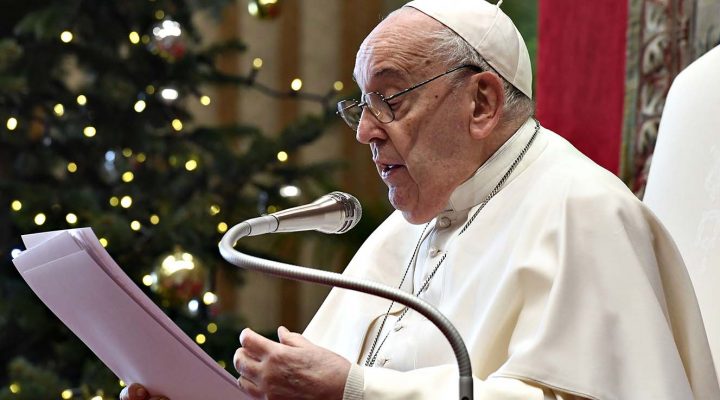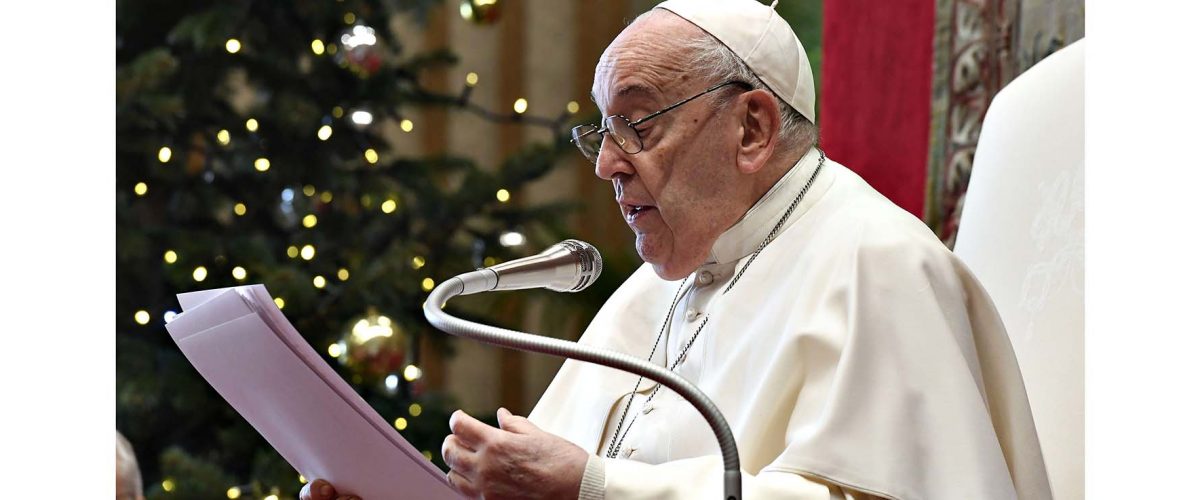Conservative Catholics and their political evangelical allies in the United States have a “Pope Francis problem.” Outbursts of severe criticism of Pope Francis increase regularly from Catholics and evangelicals alike, such as Joseph Edward Strickland, a recently fired bishop in Tyler, Texas, and Tim Busch, an attorney in Orange County, Calif.
There’s trouble brewing in the “one catholic and apostolic Church.”
A garden variety detective would recognize the clues point to an infusion of “Baptist ideologies.” The dark energies loose in the Catholic Church are not Baptist doctrines but Baptist politics. Baptists always have embraced a populist version of faith. As professor/author Harry Boyte explains, populism is defined by “the conviction that an elite has dishonored a historically, culturally or geographically constituted people, its memories, origins, common territory, ways of life.”
When Catholics start behaving like Baptists, we should know there’s trouble.
Applied to evangelical Baptists, populism has developed into a deep anger against “elite” theologians and churches. Chris Hedges lambasted this poisonous populism in his book, American Fascists: The Christian Right and the War on America. He argues a “frightening populism” of angry Christians is remaking the country in their own image.
Evangelicals and Catholics have long been engaged in what I call the American Project, each for different reasons. Many Protestants identify Christianity and America as the same entity. They have slowly blended faith and culture to create Christian nationalism.

Stanley Hauerwas
On the Catholic side, the motivation for investing in the American Project has more to do with Catholics coming to America not fitting in the Protestant power structure. Ethicist Stanley Hauerwas observed, “Catholics in America know they do not belong, which is why they are so determined to demonstrate that they are more American than the Americans.”
The American Project has succeeded beyond the wildest dreams of political evangelicals and conservative Catholics. America has conquered both expressions of faith. Of course, this has more to do with the advance of secularism than with the teachings of political evangelicals and Catholics. In any event, Christian nationalists now include conservative Roman Catholics.
American notions of freedom, opinions and individualism tend to give preachers the illusion of credibility, whether they are opposing the Pope, global warming, immigration reform or evolution.
Catholic bishops and priests have started sounding like Baptist preachers. My originating thought for this article was a sense of bemusement that the former bishop of Tyler, Texas, was interviewed by the media as if a “fired” bishop could be a spokesperson for American Catholics.
Hauerwas calls such leaders “the New York Times Catholics.” These are the priests a reporter calls after the pope has issued an encyclical or given a speech that seems offensive to American sensibilities.
The most recent “New York Times Catholic” is Strickland. He sounds like an evangelical preacher. He sounds like Paige Patterson defending his tenure as president of Southwestern Baptist Theological Seminary. He sounds like former Southern Baptist Convention President Johnny Hunt defending his actions: “If I had done what that report says I’ve done, there is no way I could have preached today.”
Evangelical preachers take pot shots at pope
Pope Francis receives unsolicited advice from evangelical preachers who can’t stand not having the same power to pontificate about any subject in the world, whether they have credibility, credentials, expertise or knowledge of the subjects. American notions of freedom, opinions and individualism tend to give preachers the illusion of credibility, whether they are opposing the Pope, global warming, immigration reform or evolution.
Evangelical criticism of Pope Francis often makes headlines. Evangelical preachers criticize the pope as if he were a local church pastor across the city. Evangelical criticisms of Pope Francis are more like movie critics panning a new release. These critics are like Pope Francis’ “Rotten Tomato” reviewers of Catholic Christianity.
Robert Jeffress, pastor of First Baptist Church in Dallas, has been harsh in his judgment of Pope Francis. When Francis criticized then-President Trump’s border wall, Jeffress countered, “The Pope has zero credibility to lecture Donald Trump or any other American about the morality of walls.”
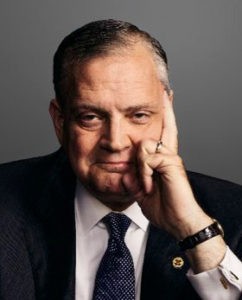
Al Mohler
When Pope Francis told a sexual abuse survivor who is gay, “God made you like this and loves you like this,” Albert Mohler, president of Southern Baptist Theological Seminary, suggested the pope was misguided if he said what he was reported as saying.
“When it comes to the Catholic Church,” Mohler said, “a wink and a nod will be ample permission for many to change their pastoral practice.” Mohler knows his Bible well enough to realize he used a negative trope comparing Pope Francis to a low-life con artist. “A scoundrel and a villain goes around with crooked speech, winking the eyes, shuffling the feet, pointing the fingers, with perverted mind devising evil, continually sowing discord” (Proverbs 6:13).
Franklin Graham, leader of Samaritan’s Purse and his father’s evangelistic association, has criticized Pope Francis over his LGBTQ+ inclusivity efforts. Francis approved a ruling at the Vatican that permitted priests to administer blessings to same-sex couples. In November, the pope said transgender people can be baptized, serve as godparents and be witnesses at church weddings. The Vatican document didn’t change church policy, but it was yet another step Francis has taken in regard to encouraging LGBTQ+ inclusivity in the Catholic Church.
Graham, with no evidence, appealed to the masses in an attempt to delegitimize Francis as out of touch. “I think there are millions of Catholics that believe what I believe,” he said. “I think what the pope has done is brought a lot of division into the Catholic Church, and I don’t think the church wants that or needs that.”
Deeply embedded anti-Catholic feelings never disappear in evangelical minds. The Catholics and evangelicals are dancing together now, but they are not yet drinking buddies.
Deeply embedded anti-Catholic feelings never disappear in evangelical minds. The Catholics and evangelicals are dancing together now, but they are not yet drinking buddies.
Jeffress, Mohler, Graham and Strickland should know Pope Francis is not biting his nails over their criticisms.
The pope’s powerful ethos
Pope Francis possesses an ethos that is older, deeper, thicker and wider than any other spokesperson of or for Christianity. In the Catholic Church, he is the vicar of Christ, the successor of Peter, the supreme pontiff. Credibility speaks of influence, character, integrity and intellectual power. Pope Francis possesses all these characteristics in abundance.
Francis is the pope with the power, authority and status that goes with being the head of the Mother Church. Jeffress has his glittering cathedral in Dallas, Graham still has the residual goodwill of his more famous father, and Mohler heads a Baptist seminary, but it’s the Holy Empire against country bumpkins.
There is a world of difference between Calvinist pastor/leader John Piper speaking for John Piper and Pope Francis saying, “The church says.” Piper may be the Pied Piper of some Baptist and evangelical Calvinists, but he’s a blip on the radar of the Roman Catholic hierarchy.
An old joke among preachers: The rabbi says, “Thus saith the Lord.” The Catholic priest says, “Thus saith the church.” The Baptist preacher says, “In my opinion, brothers and sisters.”
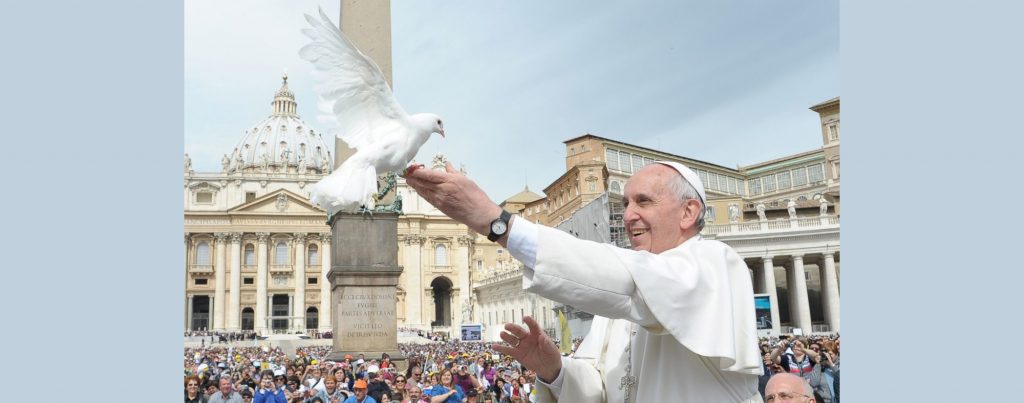
Pope Francis releases a dove in Vatican Square on World Day of Peace (Photo: Vatican News Service)
The pope’s powerful sermons
When conservative Catholic priests and evangelical preachers take pot shots at Pope Francis, he responds with powerful preaching. They seek sound bites on Fox News; the pope publishes an encyclical explaining the truth. While critics chase headlines, Pope Francis uses the most powerful pulpit in the world to proclaim the gospel, St. Peter’s Basilica at the Vatican. Speaking from the loggia of St. Peter’s to the throngs of people below, Pope Francis possesses the ethos of place that no other preacher can match.
The response of Pope Francis to his fellow Catholics and evangelical preachers has shown up most eloquently in recent sermons. He has challenged capitalism, the love of money in American churches, biblical literalism, guns, masculine dominance in the church, and church attitudes toward gays.
His recent sermons attacked the primary ideologies of the evangelical churches under the sway of Christian nationalism. Francis is dismantling the foundations of support that political evangelicals have previously enjoyed as allies of the Catholic Church.
Francis blasted the weapons industry and its “instruments of death” that fuel wars in a Christmas Day appeal for peace in the world and between Israel and the Palestinians.
Taking direct aim at American churches and preachers, Francis said, “Whenever material things, money, worldliness, become the center of our lives, they take hold of us, they possess us; we lose our very identity as human beings.”
Poking a bit of fun at biblical literalists, the pope remarked, “It irritates me a little when I hear Christians who recite verses from the Bible like parrots. ‘Oh, yes … Oh, the Lord says … He wants this ….’ But did you encounter the Lord with that verse? It is not a question only of memory: It is a question of the memory of the heart, that which opens you to the encounter with the Lord. And that word, that verse, leads you to the encounter with the Lord.”
He has broken open the patriarchal monopoly. He said, “The church is woman. And if we do not understand who women are, what the theology of a woman is, we will never understand what the church is.”
And in his most explosive words, Francis continued to push the boundaries of dialogue in relation to gays. He invited transgender Romans to his weekly audience and recently said trans people can serve as godparents and witnesses at weddings. He has met repeatedly with gay advocates and agreed it is permissible for priests to bless gay couples in some instances. (The Vatican has released guidance about such blessings, saying that while they should in no way be confused with marriage rites, “the ordained minister could ask that the individuals have peace, health, a spirit of patience, dialogue and mutual assistance — but also God’s light and strength to be able to fulfill his will completely.”)
The pope has rolled his eyes at what he sees as conservatives’ blind focus on sexual transgressions.
The pope has rolled his eyes at what he sees as conservatives’ blind focus on sexual transgressions. “We look at the so-called ‘sin of the flesh’ with a magnifying glass,” Francis said. “If you exploited your workers, if you lied or cheated, it didn’t matter. And instead (only) sins below the waist were relevant.”
American Christianity needs Pope Francis. He makes distinctly Catholic positions clear in papal encyclicals, the lives and writings of the saints, the traditions of academic theology and natural law philosophy, and his sermons. He adds gravitas, credibility and support to a developing ethical consciousness already proclaimed by progressive Christians and our secular civic religion.
Pope Francis offers hope of a third way
Conservative Catholics and political evangelicals attempt to eliminate what rhetorical scholar Joshua Gunn calls the “Third Thing.” They attack Pope Francis’ authority. When people erode authority vested in an institution, an office or a religion, there is no longer a Third Thing.
But Pope Francis can be that Third Thing in Christianity. What a revolutionary movement of the Holy Spirit would unfold if the Vicar of Rome led evangelicals in America to a spiritual revival. The Apostle Paul could testify that Christians around the world have been “lifted up to the third heaven” (II Corinthians 12:2).
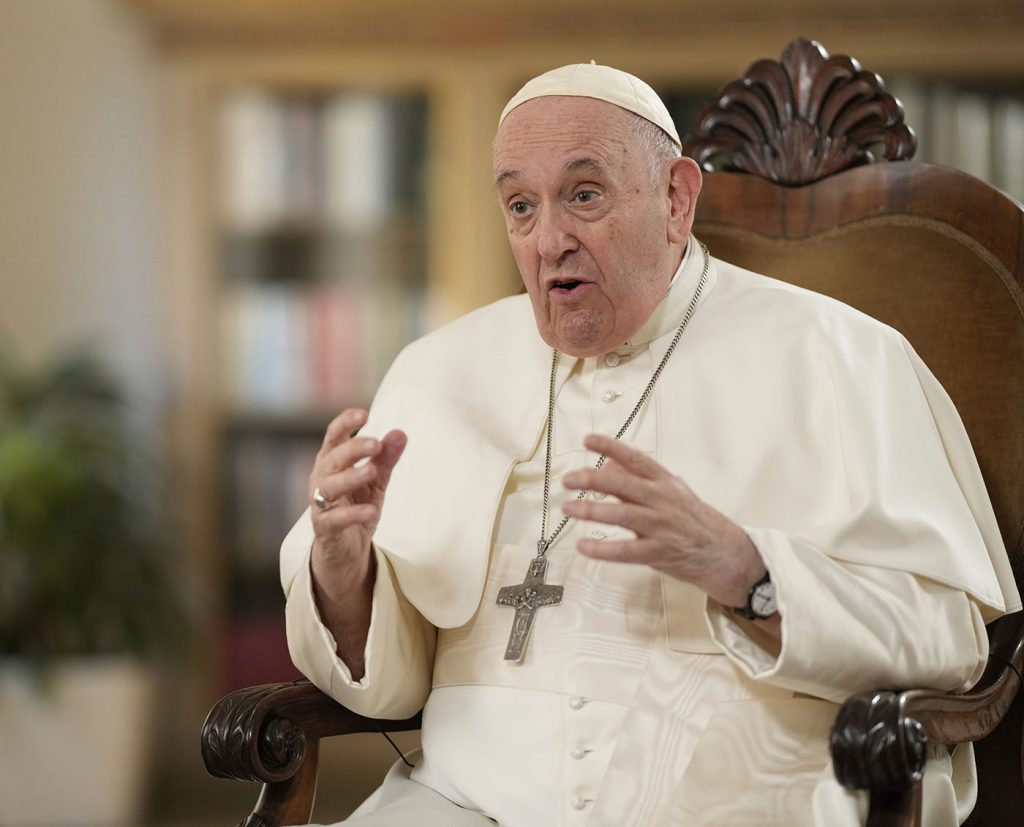
Pope Francis pauses during an interview with The Associated Press at The Vatican, Tuesday, Jan. 24, 2023. (AP Photo/Andrew Medichini)
Pope Francis, armed with Catholic social teaching, can be a catalyst for new conversations among Americans tired of the polarization of secular politics. As President Franklin Roosevelt once read papal encyclicals with enthusiasm, we need our political leaders to pay more attention to Catholic social teaching. Roosevelt, the political equivalent of Walter Rauschenbusch’s social gospel, still offers a way forward for Americans.
Pope Francis offers America a revived Christian democracy that would draw upon official church teaching as well as include the best of secular culture.
Pope Francis offers America a revived Christian democracy that would draw upon official church teaching as well as include the best of secular culture. He appeals for humanitarian initiatives, dialogue, and security to prevail over violence and death.
I am not questioning the sincerity of evangelicals and conservative Catholics; they are filled with zeal. Maybe they are convinced they have the truth, but another interpretation accounts for that zeal — fear. These Christians fear the diversity of theological voices clamoring for a hearing.
Pope Francis originally inspired criticism because he comes from the Southern Hemisphere, which gave birth to liberation theology. Added to that strong voice, we have been blessed by Black Liberation theology in the work of James Cone. Feminist theology has added layers of complexity to the undoing of the male kingdom. Progressive theologies have joined the party.
What if evangelicals and conservative Catholics are mirroring American politics of the right – a fear and mistrust of diversity, of other voices? If so, this bolsters emotional arguments about “freedom” combined with “populism” that led to the slippery slope toward fascism.
Conservative Christianity is a cultural artifact. As theologian and Old Testament scholar Ellen Davis argues, “It emanates from a culture whose ethical presuppositions and dispositions were inferior to the best of our own, a culture that was xenophobic, patriarchal, classist and bloodthirsty.”
Pulling back the curtain of conservative arguments reveals a theology too white, too male and too out of touch with diverse Christianity. American conservative Christianity is built upon the back of pro-slavery segregation, is overly focused on an exclusionary politics of citizenship and for more than a century has all but excluded African Americans, women, gays and Christians in the Southern Hemisphere.
The critics of Pope Francis may howl in self-righteous indignation, but the ideology hiding in their theology is white supremacy in all its truculent and sanctimonious power.
Francis holds out the promise of a church as an alternative to our secular politics of fear, anger and violence. The process of dismantling Christian nationalism among evangelicals and conservative Catholics won’t be easy or quick. Francis has decidedly entered the field of battle.
The movement from patriarchal, xenophobic and racist Christianity to an open and inclusive faith is always ongoing. It requires understanding and taking stances based on biology, ethnicity, body, culture, behavior, color, space and class.
Beyond that, it means standing ready to fight at intersections with other bigotries. We must fight. We must take a stand. We must have some form of hope that we can break from the modern, Western, colonial, anti-Black, racist facade of Americanism.
U.S. Christianity is bound with strong chains to American ideas of freedom, individualism and rebellion. Some progressives have decided the foundation of Christianity in America is fundamentally flawed and the patriarchal and patriotic dimensions are unalterable facts. They feel the façade of American Christianity is rotten to its core, and they have left the church.
I feel the pain that my colleagues experience, but I believe we should grab some tools and tear this house of “Americanism” down while we can. I maintain an optimistic attitude that Christian nationalism will pass from the scene. Pope Francis is a light shining in the darkness as he pushes back against evangelicals and conservative Catholics. I welcome his powerful messages to the fray. The rest of you have some decisions to make.
The gospel is the proclamation of a new age begun through the life, death and resurrection of Jesus Christ. That gospel has a political form. It is embodied in a church that is required to be always ready to give hospitality to the stranger. Pope Francis embodies that church.
A church that is an alternative to our secular politics will be a church worth saving. Imagine “one holy apostolic catholic church.”

Rodney Kennedy
Rodney W. Kennedy is a pastor and writer in New York state. He is the author of 10 books, including his latest, Good and Evil in the Garden of Democracy.
Related articles:
American Idolatry: How Christian nationalism betrays the gospel and threatens the church
The root of the problem? Christian nationalism, panelists say
Christian nationalism is a danger to our nation

